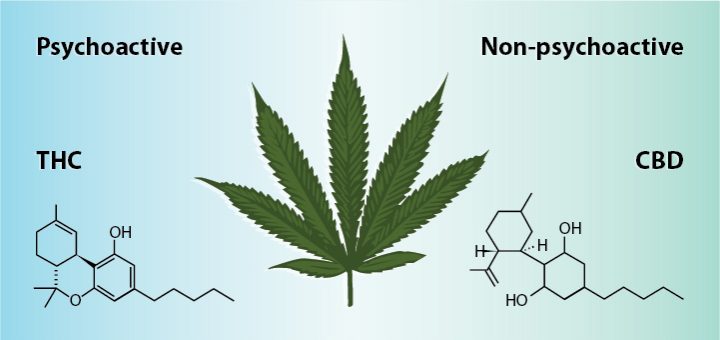CBD products can now be found all over the United States, Europe and elsewhere. But while these are nearly always made hemp, companies that make these products are often keen to stress that they have little in common with typical cannabis. While an increasing number of states are choosing to legalize cannabis at a recreational level, such as Colorado and California, many still hold reservations about doing so.
Hemp is a cannabis sativa strain but has a cannabinoid profile much different to most cannabis plants – the THC levels are so low (conforming to the 0.3 percent federal limit), that the extracts used to make hemp-based CBD products are non-psychoactive.
Therefore, CBD vape oil and e-liquid, CBD oil, CBD edibles and any products made with hemp cannot get you “high” when you use them, even in large amounts. This is key for many CBD users, who don’t want to experience mind-altering effects while medicating. For example, some like to use CBD at work to reduce stress and improve concentration; a product that contains high-inducing THC would likely just make it more difficult to focus.
Psychoactive effects are also unsuitable for younger patients, who can benefit from many of the non-intoxicating components of cannabis. We have seen this with child epilepsy patients, who often find that their seizures reduce significantly when given a cannabis oil treatment rich in CBD and low in THC – it appears that CBD calms down excitation in the brain which is responsible for seizures.
How CBD impacts the endocannabinoid system differently to THC
CBD (cannabidiol) and THC (tetrahydrocannabinol) have little in common in terms of effects, but both compounds are classified as cannabinoids since their impact on the body is mostly reserved to the endocannabinoid system (ECS). Consider the ECS to be the body’s natural cannabis system, which is comprised of receptors, found in the central and peripheral nervous system, and also endocannabinoids – these are neurotransmitters which bind to the receptors to send signals to the brain. However, cannabinoids can also influence the receptors in the ECS, leading to various effects.
Over the years, scientists have determined that the reason why THC can give the user a “high” is because it is a potent compound which binds to the CB1 receptor, which regulates appetite and mood. The endocannabinoid which typically binds to this receptor is anandamide, and it is viewed as a natural form of THC because of its endogenous anti-depressant effects. If you are familiar with the “runner’s high,” it is the increased bonding between anandamide and CB1 receptors in the brain which brings about the enhanced feeling of wellbeing following vigorous exercise.
However, THC does not break down as quickly as anandamide, meaning its effects tend to be much stronger, which lasting for a lot longer. This isn’t to say that THC is a “bad” compound, however, as it has a proven list of medical benefits. THC is a strong anti-inflammatory and may also help patients with post-traumatic stress disorder (PTSD) to deal with flashbacks.
In contrast, CBD is not an agonist of either the CB1 or CB2 receptor and does not produce such volatile effects. The cannabinoid’s reactions in the ECS are more nuanced – CBD is a negative allosteric modulator of the CB1 receptor, and this helps to suppress significant mood and appetite changes which occur when THC is present. Research has shown that CBD is an anti-psychotic, which makes it a potential psychosis medicine, and an effective way of dampening a THC high.
But the real beauty of CBD as a therapeutic compound is how it essentially helps the ECS to regulate itself, by ensuring there is enough anandamide and 2-AG in the system to bind with the appropriate receptors. With the former, CBD’s inhibition of the FAAH enzyme stifles the degradation of anandamide, which indirectly boosts concentrations of the endocannabinoid in the ECS.
Cannabis, CBD and mental health
Unfortunately, cannabis has become much more psychoactive in the past few decades, as growers have deliberately increased the THC content – subsequently, this has offset the balance between CBD and THC, which many researchers argue is crucial for effective cannabis medicine.
Cannabis has often been criticized for causing or worsening mental health issues, but the root of the problem is likely the ample THC content in many strains, given much of the encouraging new research about CBD. It’s vital to remember that as a psychoactive substance, the effects of THC are largely dependent on ‘set’ and ‘setting’, and that emotions can quickly change in an unpredictable environment. Additionally, if you’re happy and in a calm setting while taking THC, feelings of euphoria are more likely.
For those who suffer from anxiety, symptoms can be aggravated by the significant mood swings possible on THC. However, when CBD is administered as an isolated treatment, the compound clearly demonstrates anti-anxiety properties. CBD can help with generalized anxiety, social anxiety, public speaking anxiety and more by reducing activity in the brain, not dissimilarly to how CBD treats epileptic seizures. In the case of anxiety, CBD elevates the presence of gamma-Aminobutyric acid (GABA) by increasing the binding affinity of the g-protein coupled receptor which it links to. Furthermore, while the benefits of SSRIs, which are oft-prescribed for anxiety, can take weeks to manifest, the anxiety-reduction effects of CBD vape oil and e-liquid are often noticeable from the first dose.
Psychosis and schizophrenia are both mental health conditions that are thought to be triggered by normal cannabis but may be effectively treated with CBD products. The anti-psychotic properties of the cannabinoid have been confirmed in animals, and human volunteers have also reported success. Although, in the United States, without clinical trials approved by the Food & Drug Administration (FDA), it’s impossible for CBD to become an official medicine. But on a positive note, the FDA approved a CBD drug in 2018, a sign that cannabis medication is gradually becoming more accepted.
Addiction risks explained
Used sensibly, cannabis consisting of THC is not likely to cause addiction, however studies have found that around one in 10 people who start using the herb become dependent on it. This indicates that more education on cannabis is needed in society, as is given with alcohol and tobacco, and that we should be aware of the potential of chronic THC use to desensitize receptors, which leads consumers to take stronger and stronger doses to enjoy the same “high”.
Conversely, CBD presents no risk of addiction, according to the World Health Organization, which has paid close attention to the substance recently. When the Expert Committee on Drug Dependence (ECDD) met in 2017, they found that “in humans, CBD exhibits no effects indicative of any abuse or dependence potential.”
Conclusion
There is a lot of misinformation in the media about cannabis, which is understandable given that the plant has been prohibited for so long, and because all kinds of suspicious alternatives have popped up on the black market. That’s why it’s important to put focus on the studies being carried out now, which are changing how the plant is viewed by politicians and the general public. CBD products are providing a huge spurt for the overall cannabis industry, as the market for non-psychoactive cannabis emerges and expands.








